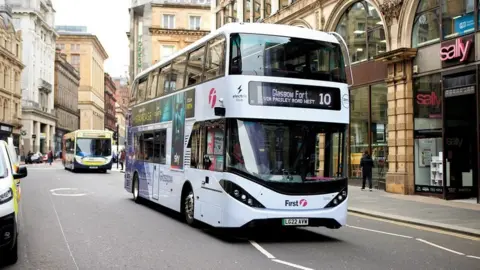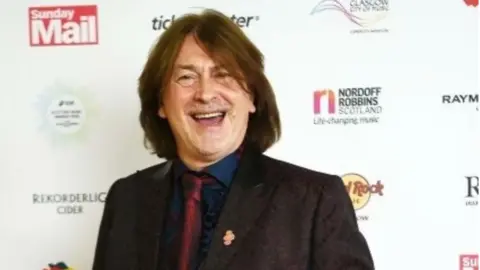Bus boss suggests bar staff drive night services
 First bus
First busThe boss of a bus company has come under fire for suggesting late-night buses could be driven by bar staff after a late shift.
First Bus said passenger numbers were not enough to sustain the 11 night services in the city beyond July.
However managing director Duncan Cameron told the Herald that the main issue was a lack of drivers.
Donald MacLeod, who owns some of Glasgow's most iconic venues, called the suggestion "idiotic".
First Bus said it had taken the decision to cancel the services because buses were regularly operating with as few as 14 passengers per hour.
Drivers will be redeployed to the daytime network to support existing services.
Speaking to the Herald, Mr Cameron said: "A driver behind the wheel is the biggest challenge.
"What's to stop somebody working in a bar being volunteered to be trained by First Bus and, as part of their shift, work for First Bus doing two journeys and the night late services?
"It might sound a bit of a wacky idea, but it would it would solve the problem and provide employment."
Donald Macleod, who owns the Garage and Cathouse nightclubs in Glasgow and convenes the Glasgow Licensing Forum, called the suggestion "idiotic".
 Donald MacLeod
Donald MacLeod"It negates all responsibility from their side," he told BBC Scotland.
"I believe a company like First Bus, after the millions of pounds of subsidies given to them during Covid - that's a public service.
"There should be legislation in place to force these companies to put services on at all times of day.
"I was not for nationalisation previously, but I really think it's something we should look at."
On Wednesday, 16 SNP MSPs representing Glasgow and the surrounding areas - including First Minister Humza Yousaf and former first minister Nicola Sturgeon - wrote to Mr Cameron, calling for the decision to be reconsidered.
But Mr MacLeod argued that the government should take more responsibility for improving public transport in the city.
"There should be an integrated transport policy in place that is supportive of people in these sectors," he said.
"That's a council and government responsibility and they've washed their hands of the problem.
"I think Glasgow is suffering a death of a thousands cuts here and none of our leaders are standing up for Glasgow as a powerhouse.
"A real failing of the city is the fact that there's no integrated travel policy - even the subway closing so early, especially at 18:00 on a Sunday is a joke."
Mr Cameron told the Herald he was surprised at the level of reaction "because it's not representative of the level of engagement or the reaction in the sessions that we've had with those who were consulted with and who we sought support from."
He said First Bus had tried to solve the problem through regular meetings with stakeholder groups for six months, and the company was still open to exploring alternative solutions in the future.
But Mr Macleod said there had been little opportunity to engage with First Bus on the issue.
He said: "They warned us that the service wasn't getting used and we said we would meet and come up with suggestions.
"And then this bombshells hits. They're not interesting in talking.
"And to not come back with any solution other than finding someone who's just worked six hours and giving them the key to a double decker - it's ridiculous."
First Bus met with Glasgow City Council on Thursday to discuss the night bus services in the city and potential solutions.
It said the company absorbed losses for over a year, with an average of 4800 passengers a month on the night buses, before finally deciding that the service was unviable.
A company spokesperson said the increased frequency on daytime routes will benefit over 600,000 passengers a month.
'Risks to the public'
Graham McNab, Unite's officer at First Bus Glasgow, said: "First Bus are a well unionised workforce who would be very unhappy at the suggestion of casualisation being introduced.
"Our members would be concerned about the risks to the public if these suggestions ever came to pass.
"Driving a bus requires skill, dedication, and awareness.
"Carrying passengers should never be considered as a second job for someone already exhausted after working an eight hour shift in a busy bar.
"Our members wouldn't accept these proposals and the idea certainly won't be supported by Unite."
Bryan Simpson, Unite's hospitality organiser, said: "For First Bus in Glasgow to even suggest that exhausted bar workers should be driving themselves home late at night is probably one of the most disrespectful comments we've heard to both bar staff and bus drivers."
"If the people of Glasgow needed any more reason to collectively demand the introduction of municipal Glasgow buses, just like Edinburgh, accountable to the people and not the shareholders, First Bus have just given them one."
A spokesperson for First Bus said that the idea was "by no means put forward as the solution - it was simply an example of the type of creative thinking that might be required by all stakeholders to overcome the labour challenges we and other sectors are continuing to face."
